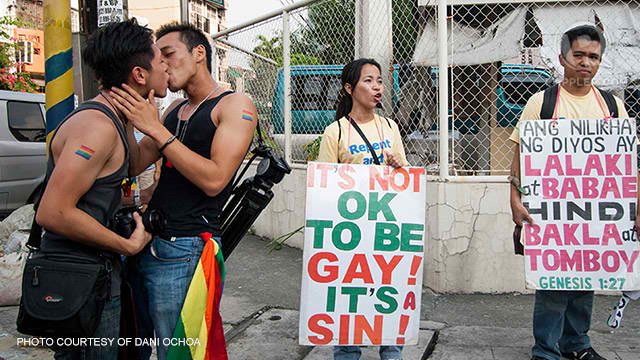SUMMARY
This is AI generated summarization, which may have errors. For context, always refer to the full article.
 “We’re discriminating against God if we’re in favor of same-sex marriage,” a 79-year-old priest said without pausing for breath.
“We’re discriminating against God if we’re in favor of same-sex marriage,” a 79-year-old priest said without pausing for breath.
“Because God did not create same-sex marriage,” argued Father Dave Clay of the Catholic Bishops’ Conference of the Philippines (CBCP). He serves as the assistant executive secretary of CBCP’s Commission on Family and Life.
On top of this, Clay acts as the national chaplain on “same-sex attraction persons.”
Yes, such a role exists.
“Now when you have two males or two females together, it doesn’t make any sense,” Clay said. “The whole point of sexual intercourse and marriage is to bring children into the world.”
Depending on his audience, the priest’s sentiments could either make or spoil someone’s day. Some would gasp – perhaps softly, for indifference; loudly, out of shock; or in quick intervals, in recovery from a laughing spell.
Others, however, would nod in unison. For them, Clay’s words are an ambrosia, a rule of life, a norm.
Such nods are virtually bobbing online, with netizens leaving bible passages as comments on stories discussing LGBT (lesbian, gay, bisexual, transgender) issues. Sometimes these quotes are followed by remarks calling LGBTs disgusting, sinful, or abnormal.
The well of insults is old yet endless. (READ: SC petition on same-sex marriage)
Clay, however, clarified he is not discriminating against the LGBT community. He said he actually has the “greatest compassion for homosexuals.”
“I don’t like discrimination. We should have great love and respect for them,” Clay said. “Be respectful of everybody. It’s better not to judge people. We don’t know what they’re thinking. They might not know that they’re wrong.”
Ironic, isn’t it?
With many Filipinos thinking like Clay, it would take a really long time before pews in the Philippines would be sat on in celebration of same-sex love.
Joy to the world

But the priest is not alone, 65% of Filipinos deemed homosexuality “morally unacceptable,” a 2013 survey by the Pew Research Center showed.
Compared to other predominantly Catholic nations, the Philippines viewed homosexuality more negatively. Meanwhile, Spain, the country that brought Catholicism to the Philippines, reflected opposite results.
| Global views on homosexuality Source: Pew Research Center, 2013 |
|||
| Morally unacceptable | Morally acceptable | Not a moral issue | |
| Philippines | 65% | 25% | 9% |
| Mexico | 40% | 36% | 15% |
| Brazil | 39% | 44% | 14% |
| USA | 37% | 23% | 35% |
| Italy | 19% | 42% | 31% |
| Spain | 6% | 55% | 38% |
Majority or 81% of Filipinos identify as Roman Catholics; making up 7% of the world’s Catholic population. This might explain why many, although not all, Filipinos are against same-sex marriage. The topic also remains unpopular among legislators.
Luckily, not all Catholic nations are the same.
|
Countries with the most Catholics |
National laws on same-sex marriage |
|
| Ranking | Country | |
| 1 | Brazil | Legalized in 2013 |
| 2 | Mexico | Legalized within Mexico City’s jurisdiction in 2009 |
| 3 | Philippines | None |
| 4 | USA | Legalized in certain states beginning 2003 |
| 5 | Italy | None |
Countries like Belgium, Canada, Argentina, Portugal, France, Uruguay, Spain, and Luxembourg, where the Roman Catholic Church has a big following, also have laws in place.
And in May 2015, Ireland, another Catholic-majority nation, became the first country to legalize same-sex marriage through a referendum in which over 60% of its citizens voted “yes.”
As of June 2015, 20 countries allow same-sex marriage nationwide and two countries allow it in certain states. Meanwhile, homosexuality remains “illegal” across 79 countries.
Catholicism, however, is not the only religion that frowns upon same-sex love. Some religions – like Islam and Mormonism – also express their opposition, while others – like Hinduism and Buddhism – have no official stance on the matter, according to the Pew Research Center.
But not all churches have closed doors. The Metropolitan Community Church (MCC), a Protestant Christian denomination located across 40 countries, supports LGBT rights and marriage equality.
The MCC has churches in Quezon City, Makati, and Baguio where they hold Rites of Holy Union or the “spiritual joining of two persons.” Such ceremonies are not legally recognized, but for many Filipinos, this is the closest they could ever get to matrimony.
Beyond marriage

Just like heterosexual couples, not all same-sex partners desire marriage. Both parties, however, deserve options.
Depriving same-sex couples of the economic and legal benefits of marriage distorts the universality of human rights, advocates argue.
Aside from love, some marry so they could legally adopt children as a couple, or so that their partner could access SSS, healthcare, property, tax, and insurance benefits, among other government services granted to married couples.
Marriage equality, however, is not the LGBT movement’s sole goal. The main struggle is for societies to finally free themselves from gender-based discrimination – felt in workplaces frowning upon LGBT applicants or employees, in schools that cannot protect kids from bullying, in hospitals where patients are ridiculed, in homes hiding abuse, and in countless other places where stigma and misinformation gang up on LGBTs.
The Philippines has had 164 cases of hate crimes since 1996; this, however, only accounts for reported incidents.
Although individual actions cannot always be policed, having a national law against gender-based discrimination could save lives. The Philippines has a bill on this, but it remains pending.
Fortunately, some local governments are already implementing their own anti-discrimination policies. But this means that only 10.4% of Filipinos live in areas protected against discrimination.
‘OA’ Advocates
In May 2015, the United Nations released its second report on LGBT rights, advising governments to enact anti-discrimination laws that penalize perpetrators and provide victim support.
SOGI (sexual orientation and gender identity) training should be provided to law enforcers, judges, healthcare workers, the media, and schools, the UN said. Countries are also advised to provide legal recognition to same-sex couples and their children, and to ban “conversion or reparative therapy.”
Will the Philippines comply?
Perhaps many Filipinos are not yet ready to witness same-sex marriages, but this does not mean that all Filipinos should be deprived of their right to marry just to please the fancy of others or of god(s).
Many netizens argue that LGBT rights are “special,” hence unnecessary. They call advocates whiny, needy, and OA (over-acting), without understanding why the struggle for genuine “gender equality” never ends.
It seems that Filipinos do not take history seriously, forgetting that without advocates, humanity would be stuck in its darkest moments like when racial segregation was an everyday affair; when women were not allowed to vote, wear pants, study, or drive; when AIDS was called “gay cancer”; when genocides stretched for years; or when homosexuality was seen as a disease.
Several countries have already learned from these mistakes; many others, however, continue to live in the dark. – Rappler.com
June is #PrideMonth. Got stories to tell? Share your ideas and stories with move.ph@rappler.com. Speak up on #GenderIssues!
Add a comment
How does this make you feel?
There are no comments yet. Add your comment to start the conversation.